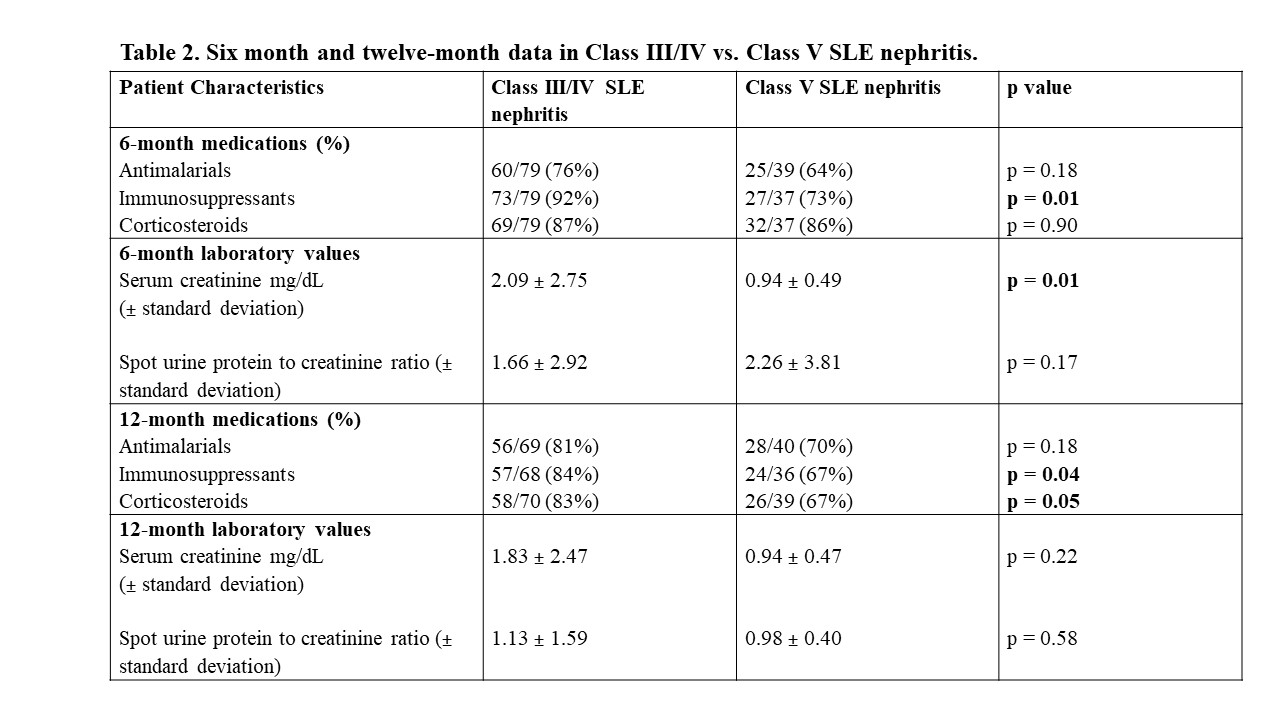Session Information
Session Type: Poster Session D
Session Time: 8:30AM-10:30AM
Background/Purpose: Few studies have investigated treatment patterns and renal outcomes in class V systemic lupus erythematosus (SLE) nephritis patients compared to class III/IV patients. Prior findings are mainly from older clinical trial data. Using real-world, electronic health record (EHR) data, we compared prescribing patterns, laboratory data, and renal outcomes in class V compared to class III/IV SLE nephritis patients.
Methods: Using a large, de-identified EHR database called the Synthetic Derivative with over 3.2 million subjects, we identified incident SLE nephritis patients. We used previously published and validated SLE EHR algorithms with positive predictive values ranging from 86 to 95% and then searched for patients with keywords of “nephritis.” We conducted chart review to ensure patients were incident SLE nephritis cases and had a diagnosis based on a renal biopsy. We also collected demographic and medication data prescribed at diagnosis (baseline), 6 months, and 12 months. We also assessed serum creatinine (mg/dL) and spot urine protein to creatinine ratios at baseline, 6-months, and 12-months. We examined for renal replacement therapy, defined as ever received dialysis or renal transplant. For SLE nephritis patients with multiple classes, we included patients with pure class V nephritis and patients with either class III, IV, or III + IV nephritis.
Results: We identified 43 incident class V and 86 incident class III/IV SLE nephritis patients. Sex, race, and ethnicity were all similar in class V vs. III/IV patients (Table 1). At baseline, class V SLE nephritis patients were less likely to be on antimalarials (52% vs. 75%, p = 0.01), immunosuppressants (55% vs. 87%, p < 0.001), and corticosteroids (76% vs. 94%, p = 0.003) compared to class III/IV patients. Class V SLE nephritis patients were also less likely to be prescribed immunosuppressants at 6 months (73% vs. 92%, p = 0.01) and 12 months (67% vs. 84%, p = 0.04) compared to class III/IV patients (Table 2). At 12 months, there were lower corticosteroid rates in class V vs. class III/IV (67% vs. 83%, p = 0.05). For baseline laboratory values, class V patients had similar spot urine protein to creatinine ratios but lower serum creatinine levels compared to class III/IV patients (1.04 mg/dL ± 0.87 vs. 1.90 mg/dL ± 2.38, p = 0.002). This lower serum creatinine trend for class V vs. class III/IV nephritis patients continued at 6 months (0.94 ± 0.49 vs. 2.09 ± 2.75, p = 0.01) with similar values at 12 months (Table 2). Class V patients had similar rates of renal replacement therapy (18% vs. 28%, p = 0.22) and death (12% vs. 15%, p = 0.59) compared to class III/IV SLE nephritis patients.
Conclusion: Our study demonstrated that class V patients were undertreated for their renal disease compared to class III/IV patients, particularly at time of diagnosis but also at 6 and 12 months after diagnosis. Class V patients may get undertreated for their renal disease, as it is generally thought that these patients will have a better prognosis compared to class III/IV patients. Our real-world, EHR data suggest that class V SLE nephritis patients are still at risk for adverse renal outcomes at similar rates to class III/IV patients and need appropriate treatment.
To cite this abstract in AMA style:
Barnado A, Camai A. Class V Systemic Lupus Erythematosus Nephritis Patients Are Undertreated and Face Similar Adverse Renal Outcomes as Class III/IV Patients [abstract]. Arthritis Rheumatol. 2021; 73 (suppl 9). https://acrabstracts.org/abstract/class-v-systemic-lupus-erythematosus-nephritis-patients-are-undertreated-and-face-similar-adverse-renal-outcomes-as-class-iii-iv-patients/. Accessed .« Back to ACR Convergence 2021
ACR Meeting Abstracts - https://acrabstracts.org/abstract/class-v-systemic-lupus-erythematosus-nephritis-patients-are-undertreated-and-face-similar-adverse-renal-outcomes-as-class-iii-iv-patients/


